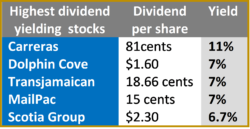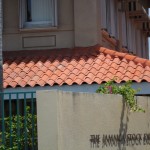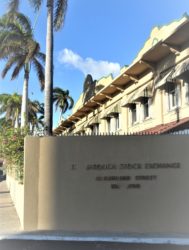TransJamaican Highway Board of Directors approved an interim dividend payment of 9.43 cents per share that will be paid on April 24, 2024, to shareholders on record as at the close of business on April 3, 2024, with the ex-dividend date is April 2, 2024.
 This is the first time since the listing of the shares in 2020, that an interim dividend is paid so early in the year, suggesting that the company is moving to a twice a year pay out. The dividend is just over half of the 18.66 cents that was paid in September last year, as the only payment in 2023. Combined the two dividends resulted in a yield of just over 20 percent based on the stock price of $1.36 in March last year. In addition, the stock price jumped 148 percent over the twelve months.
This is the first time since the listing of the shares in 2020, that an interim dividend is paid so early in the year, suggesting that the company is moving to a twice a year pay out. The dividend is just over half of the 18.66 cents that was paid in September last year, as the only payment in 2023. Combined the two dividends resulted in a yield of just over 20 percent based on the stock price of $1.36 in March last year. In addition, the stock price jumped 148 percent over the twelve months.
In discussion with a senior officer of the company, ICInsider.com could not get confirmation if the payment to come is an official move by the company to make dividend payments twice per year, but the recent move sends a clear message of twice a year payment.
What ICInsider.com gleaned is that they are still in discussion with the government to establish the terms of agreement for the Mandeville leg of the highway.
Transjamaican heads for twice a year dividend?
Caribbean Cement and poor management
Investors entrust capital to public companies with the expectation that their interests will be properly protected, but that does not appear to be the case with local investors at Caribbean Cement Company. Last year against to outcry of local investors the company rammed through fees for royalty to be paid in addition to management fees already be paid to Cemex, the ultimate parent company.
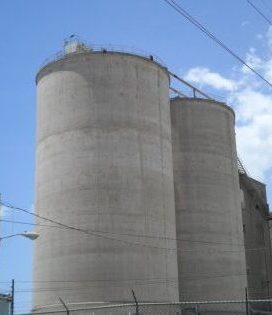
Caribbean Cement proposed a $1.50 dividend per share in August
Last month, the company proposed a meeting to consider the payment of a dividend that was not managed appropriately by the company, neither before nor after the meeting.
The Board of Directors Caribbean Cement Company advised shareholders that a meeting of the board that was held on May 26, 2022, recommended presenting an ordinary resolution to shareholders to declare a final dividend of $1.5032 per share payable on August 15, 2022.
That is a great development, considering the company last paid a dividend in 2004, but the wider public was deprived of such price sensitive information. To compound the problem, the company haled the meeting and kept the information for a week before communicating the decision to the exchange, even though the rules require immediate release of the decision immediately after the meeting.
In an article reporting the decision of the board, the company through its secretarial department took issue with the article stating that they seem to have breached the JSE rules that require that any meeting to consider the payment of a dividend must be communicated to the JSE at least 7 days ahead of the meeting. So far no such notification was posted on the Stock Exchange’s website up to Tuesday evening.
The company provides the evidence of two letters addressed to the Jamaica Stock Exchange notifying that a meeting would be held initially on May 23 another dated May 20 indicates a change in the date to May 26. None of these letters are yet on the Jamaica Stock Exchange’s website.
A spokesperson at the JSE confirms that the letters were in fact received but that it is the responsibility of the respective companies to ensure that the notice is uploaded to the JSE portal from which the relevant staff would approve the same to be uploaded to the website.
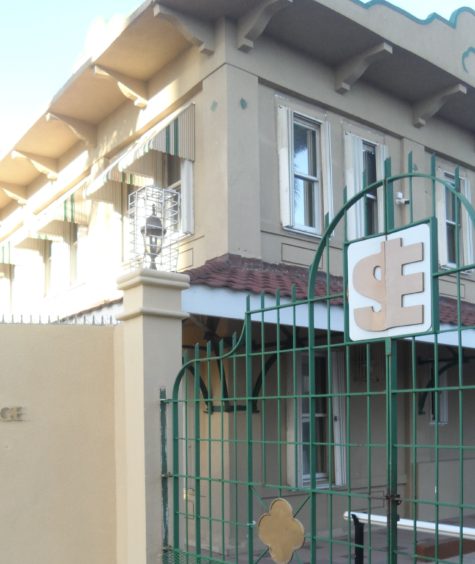 While the JSE was informed by letter technically, the company is in breach as they did not follow up to ensure the information was received and in fact posted to the website what was very sensitive information considering this is the first time that the company would be considering a dividend payment since 2004 when they last paid one amounting to 7 cents per share amounting to $60 million.
While the JSE was informed by letter technically, the company is in breach as they did not follow up to ensure the information was received and in fact posted to the website what was very sensitive information considering this is the first time that the company would be considering a dividend payment since 2004 when they last paid one amounting to 7 cents per share amounting to $60 million.
Based on the price movement in the market last week it appears that the information was already in the market.
While Caribbean Cement cannot escape responsibility for the matter not being communicated to its shareholders on a timely basis, The JSE cannot escape some blame either. Once the letters were received they should have followed up with the company since it was not on the portal.
No one seems to be following up on electronic communication in this modern era. The handling above, epitomizes, what seems like today’s communication practice that assumes once an email is sent, the other party must have read it, and therefore there is no need to follow up.
Cement traded at $67 on the 16 of May, the next day the last price fell to $64.80 and then to $61.50 on the 18, bouncing to $63 on May 19, but back to $60.51 on the May 24. On the 26 and the 27, the price moved up to $63 and moved to $69.70 on the first of June and traded at $66 on June 6, and jumped to $74 on the 7th.
Dividend payment lifts QWI stock 25% in days
QWI Investments‘ shares gained 14 percent in 2021, with the price closing at 88 cents, a level it remained at until the company announced on February 8, the holding of a board meeting to consider a dividend on Valentine day, February 14, investors have since pushed the price over $1 for a rise of 25 percent at the high of $1.06 it traded at on Wednesday.
 At the close of trading on February 7 the price close at 85 cents and ended at 90 cents the next day and closed at $1.01 on the 9th.
At the close of trading on February 7 the price close at 85 cents and ended at 90 cents the next day and closed at $1.01 on the 9th.
At the board meeting, the company approved a dividend of 3.5 cents per share amounting to $47.78 million that will not be subject to taxation, payable on April 7. The board also approved and announced a dividend policy of paying out 20-25 percent of profits annually as dividends in two separate payments. The dividend to be paid is equivalent to just over 4 percent on the pre-announcement stock price and translates to an annual return of nearly 25 percent.
The stock has since climbed to $1.06 in trading on Wednesday morning the first day of trading after the information was disclosed to the Jamaica Stock Exchange, but closed at $1.04 after trading 3.26 million shares.
The gains in the stock since the initial announcement is 24.7 percent as a result investors in the stock before February 8, will enjoy a near 50 percent return if the price remains at these levels after the stock goes ex-dividend in mid-March.
The company continues to record gains in net asset value, with a record $1.56 on February 11, up 11.4 from $1.40 at the end of December and 16.4 from $1.34 at the end of September last year. That translates to a profit of $300 million after provision for taxation from September up to the end of last week and if is sustained would result in an additional payout. The announced dividend policy could be a major game-changer for the stock that has languished below $1 since eh decline in the market in 2020 as the dividend yield could make it an attractive income producer for investors.
The Chairman of QWI Investments is the principal of ICInsider.com.
Profit jumps 33% at Carreras but..
Sale revenues for the June quarter this year jumped 27 percent to $3.4 billion at Carreras, from a depressed $2.7 billion in 2020, with profit after corporate taxes surging 33 percent to $863 million from $651 million in 2020.

Carreras is one of Jamaica’s best dividend payers
The latest results, while looking impressive, have resulted mainly from a 27 percent fall in revenues in the 2020 June quarter from revenues of $3.458 billion in 2019. The 2021 profit is lower than the $923 million aftertax profit earned in 2019.
Cost of goods sold rose faster than revenues with a 30 percent increase from $1.37billion to $1.78 billion percent. Other operating and administrative expenses, including finance costs, rose four percent from $514 million in the 2020 quarter to $536 million.
The operations generated gross cash flows of $820 million, but after paying dividends of $1.2 million, resulting in a reduction of $786 million in cash on hand at the end of March. At the end of the quarter, shareholders’ equity stood at $1.75 billion, with lease financing at $251 million. Current assets ended at $3.47 billion, including cash and equivalent of $1.4 billion and Receivables of $1.56 billion. Current liabilities ended at $2 billion.
Earnings per share came out at 17.8 cents for the quarter, with ICInsider.com forecasting 80 cents per share for the year to March 2022, with a PE of 11.5 times earnings at the last traded price of $9.19 for the stock on the Main Market of the Jamaica Stock Exchange. The stock is now mostly regarded as a good dividend payer with a high yield of 8 percent, with profit hardly growing as the product it sells is not expected to enjoy much growth.
NCB releases Q3 results next week
NCB Financial Group advises that its board meeting to consider and approve the release of the nine-month unaudited financial statements at a board meeting scheduled for August 4, 2020.
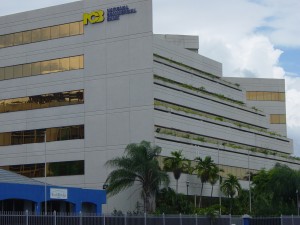
NCB Financial Head Office
The company stated that further releases issued in April and May this year, they are confirming that a dividend is not likely to be declared at the meeting.
The group enjoyed a 41 percent increase in profit in its first quarter, but that fell in the second quarter, with a net profit of $13.4 billion for the first six months of the 2020 financial year. Net profit attributable to our stockholders was $9.6 billion, a 23 percent or $2.9 billion decline from the prior year. The preceding year’s results included a one off-gain of $3.3 billion from the disposal of our interest in an associate company. Excluding this gain, net profit would have increased by $408 million or 4 percent over the prior year.
Scotia Group aiming to up profits
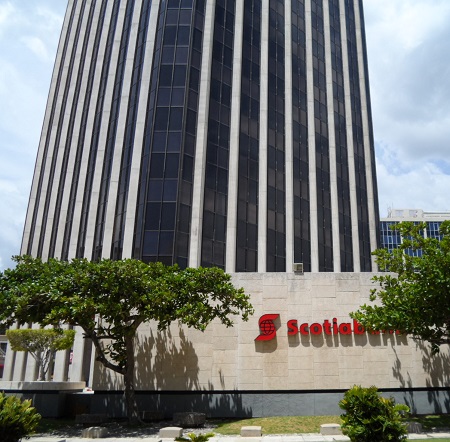
Scotia Group headquarters in Kingston.
The 2019 fiscal year is turning out to be one of the best in recent times for the number 2 banking group in Jamaica – Scotia Group. The current year was not the best performing, but it delivered on many counts for the majority Canadian owned banking group.
Critically, the primary engine driving profits – loans, grew 12.6 percent, or $23 billion to $206 billion. According to the Managing Director, David Noel, “total loan growth remained strong throughout the period with a year over year increase of 13 percent. Highlights from our Retail Banking portfolio include a 17 percent year over year growth in our Scotia Plan loan portfolio. Our mortgage portfolio continued to perform well and grew 13 percent year over year as we continue to boast one of the most competitive mortgage rates in the market. Our total commercial loan book increased by 14 percent over the prior year. Of note, commercial loans to the private sector increased by 27 percent when compared to the same period last year.”
The group reports a net profit of $13.19 billion for the year to October, an increase of $419 million or 3.28 percent over the prior year. In 2018, the group booked gains on the sale of a subsidiary of $753 million, when this gain is excluded, net profit from ongoing operations increased by stronger 9.75 percent amounting to $1.17 billion.
Performance for the year was affected by lower net interest income due to declining interest rates and higher loan loss provision, following the adoption of a new accounting standard. Net interest income after expected credit losses for the year totaled $22.5 billion, down $767 million or 3.3 percent, compared to the prior year. Importantly, the group’s final quarter numbers show marked improvement in net interest income compared to the 2018 quarter. Net interest income delivered $6.4 million to the quarterly results compared to just $6 billion in 2018, while Net interest income after expected credit losses rose from $5.35 billion in the October 2018 quarter to $5.75 billion in 2019.
Scotia reports that “our credit quality remains strong and actual delinquency is down year over year, with loans on which there is no interest being booked for representing 1.77 percent of gross loans compared to 2 percent in the prior year.”
The Group reports, “operating expenses were also higher than the prior-year due partially to increased fraud-related expenses, as well as increased investments in technology and business optimization which we believe are necessary investments for the future.”
“We will continue to make investments in our infrastructure, including a $500 million investment to create a state of the art branch. Renovations have also begun at our head office building, where we are investing $1 billion to upgrade and modernize our facilities to create a more efficient and collaborative environment.”
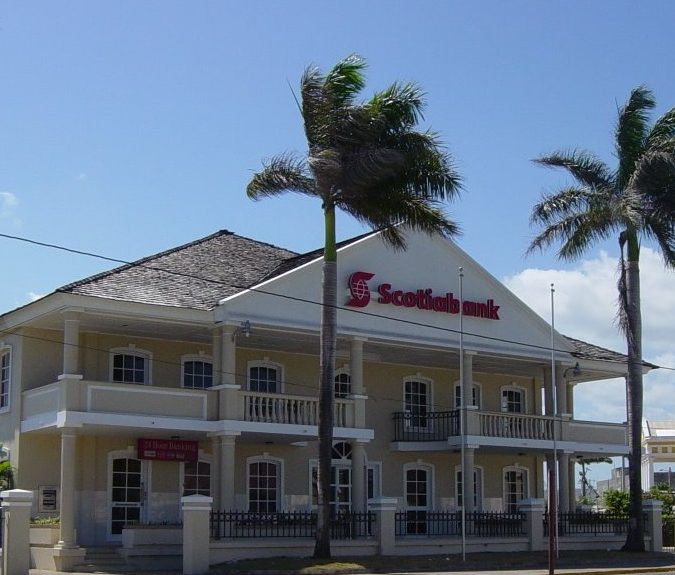
Scotia Group’s Falmouth branch
Operating expenses for the year amounted to $24 billion for the period, an increase of $2 billion, or 9.54 percent compared to the prior year. Salaries and staff benefit costs increased by $697 million or 6.76 percent primarily due to increased incentives to the sales team resulting in the growth of in the loan portfolio, while other operating expenses grew by $1.37 billion. The growth in other operating expenses was attributable to increased technology investments such as ATM software, online banking enhancements, security chips for credit cards and network upgrade to support our digital strategy. Tax on assets increased by $45 million to $1.13 billion.
Segment results saw Treasury generating revenues of $8.2 billion up from $7 billion in 2018 with a profit of compared to $4.1 billion in 2018. Retail revenues grew to $18.9 billion up from $18.3 billion in 2018, with a profit of $3.6 billion compared to $4.9 billion in 2018. Corporate and Commercial banking saw revenues rise from $7.8 billion to $8 billion and profit hitting $1.4 billion in 2019 versus $2.75 billion in 2018. Insurance services grew revenues from $5 billion to $5.1 billion and generated a slightly higher profit of $3.97 billion from $3.8 billion in 2018. Investment Management generated revenues of $3.5 million and a profit of $2.3 billion in 2019 compared to $3 billion in revenues and profit of $1.8 billion in 2018. Other operations raked in revenues of $1.54 in 2019 with a profit of $1.5 billion, in 2018, revenues were just $1 billion with a profit of $965 million.
Other income for the year, other than interest income, increased by $3 billion or 17.97 percent over 2018. Net fee and commission income amounted to $8 billion, marginal declining of $22 million. Insurance revenues increased by $371 million or 12.64 percent to $3.30 billion due mainly to higher premium income year over year, partially offset by lower actuarial reserve releases, the group reported.
Net gains on foreign currency activities and financial assets amounted to $8.43 billion, up by $3.3 billion or 63 percent above last year due to increased market and trading activities. Deposits by the public grew to $313 billion, up from $288 billion in the previous year.
The Group’s shareholders’ equity stands at $118 billion from which the Board of Directors approved a final dividend of 55 cents per stock unit, or $1.7 billion, up from 51 cents per share in 2018. The current dividend is payable on January 15, 2020, to stockholders of record on December 24. The January 2020 dividend brings the total payment for the year to $4.76 after the group made two special dividend payments during the year.
The group reported earnings per share of $1.09 for the final quarter and $4.24 for the full year, earnings per share for 2020 should hit the $5 mark.
Scotia Group is a good stock for income and long-term growth.
JSE – directors cannot override AGM decision

Palace Multiplex in Montego Bay.
IC insider.com was informed that the Jamaica Stock Exchange stopped the payment. In discussion with the JSE they indicated that the company did not comply with the rules of the exchange to inform them of the dividend. Accordingly, the change in dividend payment was to allow for the public to have notice of the ex-dividend date.
That of course is only partially true, while the company did not advise the exchange when the directors were to meet to approve the dividend and what was the outcome of the meeting. The exchange had adequate notice of the payment from October 31. The exchange JSE staff did nothing about the information that they got and approved for posting on their website.
The company’s directors’ report clearly states that the dividend had an xd dividend date of January 4 with the payment to be made on January 18. The annual report was posted on the JSE website from October. The directors, report along with the audited report were put to the meeting for acceptance which was done.

Andre Tulloch, head of the JSE regulatory arm.
Shareholders after approving the directors’ report, approved the resolution for the payment of the dividend, effectively agreeing to ex dividend and payment dates as set out in the directors report.
In the wisdom of the Jamaica Stock Exchange, they ignored the supremacy of the AGM and forced the company to submit information to change all the dates relating to the dividend. They failed to understand that the directors have no powers to change what the shareholders approved, and if a change is to be made, then the directors would need to call a general meeting to get shareholders to make the change. The correct remedy would have been some reprimand not a call for a non-legal action.
The requirements of the JSE is that any meeting at which a dividend is to be consider should be communicated to the JSE no later than 7 days before the date of the meeting and within 48 days of the meeting the decision taken. This was not done by Palace, but the JSE who had notice of the declaration from the end of October, did nothing about it for more than two months.
On 17 January, a posting on the JSE website showed that the record date was changed to January 31. The posting stated the “Palace Amusement (PAL) has advised that following decision made at their Annual General Meeting in December 2018, to pay a dividend of $2 per stock, the payment will be made on February 8, 2019, to the shareholders on record as at January 31, 2019, The ex-dividend date is January 30, 2019.”
The added problem is that shares were traded in January after the xd date of January 4. The seller would have expected to collect the dividend that was approved. It also means that cheques already drawn, may have to be redone, to record the new record date.
The JSE has clearly, made a huge error in this matter and should immediately correct it, to prevent a messy situation from getting worse. You cannot correct a wrong by another wrong.
Scotia hikes dividend

David Noel new Scotia Group’s CEO.
Scotia Group delivered below par performance in that final quarter of the 2018 fiscal year, with profit falling to just $1.6 billion from $3.36 billion in 2017.
The quarterly results, however, is not an indication for what can be expected for the 2019 fiscal year as one time fall in revenues and in some cases, expenses are unlikely to be reflected for the full year to come. In keeping with expected pick up in profit the banking group hiked their dividend from the usual 48 cents per share to 51 cents in their latest announcement. Based on Scotia’s long held policy, when dividends are raised it is usually an indication that future dividend payments will continue at the elevated level for the ensuing period. Investors in the stock can therefore look forward to at least $2.04 cents for all of 2019. That will be a return on the latest stock price of $54.01 of 3.8 percent. Dividends paid in 2018 amounted to $1.92 per share. The total amount of dividends to be paid in January will be $1.59 billion which is alomost all the profit reported for teh quarter. The dividend will be paid on January 18, 2019, with the ex-dividend date set for December 24.
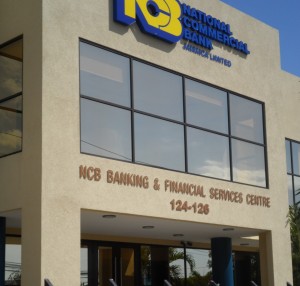

 Customer deposits increased by $196.4 billion or 68 percent, to $484.8 billion, again primarily driven by the consolidation of Clarien which has deposits in excess of US$1.1 billion. The Jamaican deposit taking segments accounted for a total combined increase of 18 percent, the report to investors stated.
Customer deposits increased by $196.4 billion or 68 percent, to $484.8 billion, again primarily driven by the consolidation of Clarien which has deposits in excess of US$1.1 billion. The Jamaican deposit taking segments accounted for a total combined increase of 18 percent, the report to investors stated.


